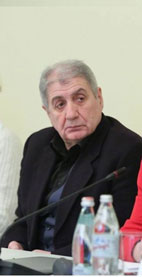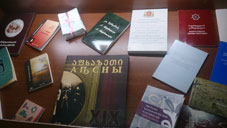
Prospects of Georgian -Abkhaz Relations
By Mariam Chanishvili
Thursday, December 1
The Messenger interviewed the Director of the Research Institute of Georgian-Abkhaz Relations at Tbilisi Ivane Javakhishvili State University, Zurab Shengelia
During the war in Abkhazia in the 1990s, Zurab Shengelia was a Member of Parliament of Georgia and was actively involved in Abkhazian issues. One of his initiatives was to introduce an amendment in the Constitution of Georgia, Article 8(2) which states that “…the official language of the Autonomous Republic of Abkhazia shall be Georgian and Abkhazian”.
After quitting politics, he started thinking about the problem of granting Abkhazia a certain level of independence, so that on one hand not to undermine territorial integrity and sovereignty of Georgia and on the other, to satisfy certain ambitions of the Abkhaz society. With this approach, he implemented several projects. The Institute of Georgian-Abkhazian Relations was established in 1999 within Tbilisi Ivane Javakhshivili State University to restore confidence between the Georgian and Abkhaz societies through the promotion of mutually beneficial cultural and social contacts.
Over the course of its existence, the Institute has developed multiple projects and published more than 50 bilingual books in cooperation with their Abkhaz colleagues and with support from the state and international institutions. For example, a book called 'Abkhazia XIX' was printed with the assistance of the Embassy of the Republic of Lithuania to Georgia.
One of the successful projects implemented by the Institute was Radio Hara, thinks Mr. Shengelia. "Hara", prepared musical and news programs in the Abkhaz language which was broadcast throughout Abkhazia for half an hour four days a week (1998-2007). This project even caused some controversy; some radical newspapers in Abkhazia were publishing posts stating “Do not listen to the enemy’s voice.”
Among other projects was the development and publishing of two editions of Georgian-Abkhaz conversational dictionaries (1999-2000), the translation of Georgia’s main normative acts on the rights of ethnic, linguistic and religious minorities in the Abkhaz Language (2000), publishing a book on Abkhaz folklore and literature for children (2000), and summer camps for children.
The Institute has also served as an important hub for collecting and spreading information on the past and current developments in Abkhazia as well as an actively facilitating of people-to-people relations between the two communities.
The Institute has been an active promoter of the Abkhaz language in Georgia. Since 2000, tutors from the organization have been giving free lessons to those interested in acquiring basic Abkhaz language skills. The classes run twice a week and are delivered by native Abkhaz speakers.
Nowadays, Abkhazian society is facing several problems. One of the problems is the Aibga village issue. Aibga is located very close to Sochi (Russia) - it is even possible to walk between the two - and Aibga served as an important place to guarantee the security of the Sochi Winter Olympic Games in 2014. Russians wanted to construct a road there to access the territory and eventually take over the settlement. This caused anger amongst the local Abkhaz community. All the documentation about the border demarcation are kept in the Institute.
Another serious problem is related to Russian private property policies for Russian citizens in Abkhazia. Russia follows the logic that Abkhaz and Russian people hold the passports of citizens of Russia; if ethnic Abkhaz citizens have the right to purchase property and run a business in any part of Russia, ethnic Russian citizens should also enjoy the same rights in Abkhazia. This has caused serious concern in the Abkhaz community.
The Abkhaz society thinks that if the Republic of Abkhazia is independent, the main impact on the development of its economy would be related to tourism. Russians want to build the Industrial Port and Logistics System, and also to restore the railway linking Abkhazia with Georgia. Abkhazians are concerned because the railway is very close to the seaside and recreational areas, and so this might result in a reduction of tourists.
Because of all this, serious confrontations have occurred between the Abkhazian society and the local government, which is unable to resist Russian pressure.
Nowadays, among the Abkhazian population, the number of Georgians and Abkhazians is still higher than any Russian immigrants. Russia was concerned by this, and as a result, some Georgians were deprived of the right to vote. If the current situation continues for the next 20-30 years, the Abkhaz nation will disappear. There are clear symptoms of such developments; their life expectancy is very low, blood diseases are very common and the mortality rate is higher than the birth rate.
In addition, Russia has reduced donations to the Abkhazian budget since 2013.
According to Zurab Shengelia, the attitude to this conflict has become more indifferent. He thinks that during 2008-2012, the Abkhazian and Georgian relationship was not hindered and these were the best years to restore relations between Sukhumi and Tbilisi.
Several organizations have decided to collaborate and start a new program that will lead to the creation of the Abkhazian Encyclopedia. Shengelia mentioned that it was upsetting that the Georgian Encyclopedia decided not to take part in this program and the possible reasoning for this was ‘not to irritate the Russians’. He thinks that this program is one of the great prerequisites for future collaboration and reconciliation.
Shengelia stated that there is an existing idea of restoring Radio Hara through the internet, since Abkhazia is actively developing internet access. The European Union Monitoring Group has shown interest in this issue and the Institute of Georgian-Abkhazian Relations has asked the Presidential Reserve Fund to help with the restoration of the radio.
He noted that if Georgia takes reasonable steps towards the survival of the Abkhaz nation, and Georgia creates real conditions for it – meaning the survival of the Abkhaz ethno-cultural space – cooperation between Abkhazia and Georgia will become a tangible goal.


